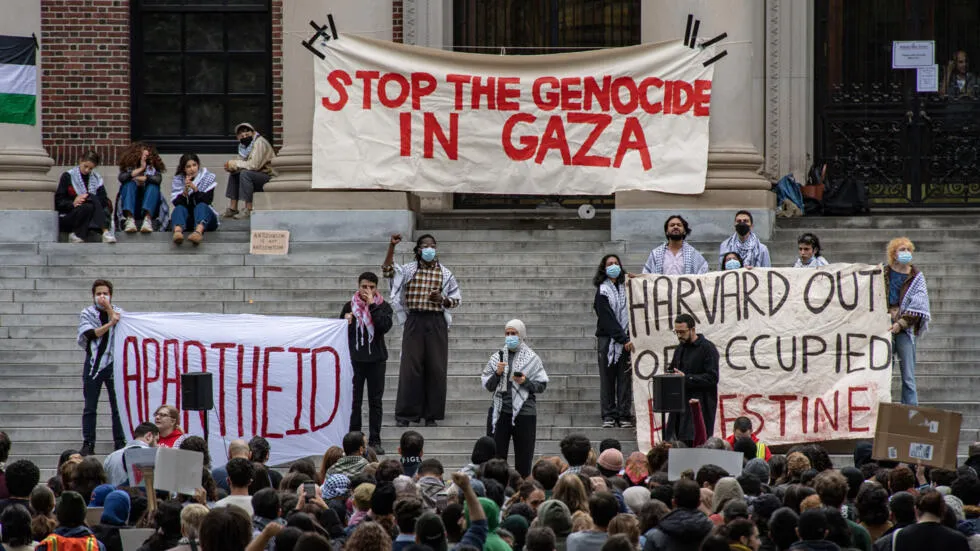Global University Protests Demand Solidarity with Palestine Amid Rising Tensions
From the United States to France, university campuses have become hotbeds of political activism as students rally against Israeli attacks on Gaza and face university administration and security responses.
Published May 01, 2024 - 00:05am

Image recovered from elkhabar.com
Student-led protests continue to sweep through university campuses worldwide, demanding solidarity with Palestine and condemning ongoing Israeli aggression toward the Gaza Strip for approximately seven months. American universities experience enduring sit-ins, despite security interventions and the arrest of hundreds of students. The specter of university graduation proceedings remains uncertain amidst these activities.
Institutions such as Columbia University in New York have begun negotiations with protesting students, while California's universities witness clashes over the issue. Elsewhere, at the University of California, drastic measures such as 'emergency closure' and deferred graduation ceremonies emphasize the growing fervor of the demonstrations.
Protesters call for the divestment of university funds from Israeli state and institutions amid concerns over escalating anti-Semitic sentiment and possible deployment of the National Guard as cautioned by House Speaker Mike Johnson. These events in America are echoed globally, with demonstrations in countries like Australia, Canada, India, France, Egypt, and Tunisia, plus Iranian students joining the movement. Yemeni universities have also staged protests, underscoring the international reaction against actions deemed contrary to human rights, liberty of speech, and peaceful assembly.
The Republican Senator Rick Scott has urged the US Department of Justice to prosecute pro-Palestinian student groups accused of civil rights violations against religious minorities. These remarks come as significant university campuses like Columbia initiate corrective actions against students participating in sit-ins.
Sorbonne University in Paris, France, shut its doors following protests echoing the student movements across the Atlantic. French political figures have called for further participation, marking a substantial European amplification of the academic protests.
Over in Richmond, Virginia, local police disbanded a sit-in at Virginia Commonwealth University, arresting students rallying in Gaza's support. This confrontation reflects the domestic and global reach of these university-led protests, challenging both Israeli action against Gaza and the academic institutions' entanglement in these geopolitics.
The spike in student activism has its roots in a complex web of geopolitical tensions and human rights concerns. As university campuses become battlegrounds for ideological debates, the very values that these institutions stand for are being scrutinized. The protests, geared towards urging their schools to cut financial ties with Israeli entities, are a reflection of a broader outcry for universities to align their investments with what students believe to be ethically sound and socially responsible conduct.
These demonstrations have also ignited broader discussions about free speech on campus, with university administrators and student groups attempting to navigate the fine line between peaceful protest and disruption. Critics of the protests argue that the actions of some students infringe upon the rights of others and create a divisive environment, even as organizers insist on the legitimacy and urgency of their cause.
The tension on campuses comes at a time when social media fuels both national and international mobilization, connecting disparate groups in a united front. Hashtags and online campaigns have brought greater visibility to the situation in Gaza, influencing public opinion and drawing in those who might otherwise remain disconnected from the issue. This digital era of activism challenges traditional notions of protests, transcending borders and fostering a new age of global student movement.
Meanwhile, universities are grappling with the challenge of managing peaceful protests while maintaining campus order and ensuring the continuation of educational activities. University officials are also faced with the dual pressure of addressing the concerns raised by students and facing potential backlash from donors or external stakeholders. The situation requires a delicate balance between upholding free speech and providing a secure learning environment for all students.
Despite the arrests and the potential for heightened interventions, student protests show no sign of abating. If anything, the response from authorities and university administrations appears to have strengthened the resolve of many protestors. The increasing solidarity among students internationally suggests a significant cultural shift, where the demand for social justice extends beyond local concerns, drawing a diverse array of voices into a concerted call for change.
As the academic year progresses, the world watches closely. The eventual outcomes of these protests — whether they lead to policy changes at universities or in government, a de-escalation of tensions, or further confrontations — will be telling of the zeitgeist among the youth and their role in shaping the politics of tomorrow. These events underscore a central question that remains: How will institutions of higher education evolve in response to this dynamic groundswell of student activism?



:quality(70)/cloudfront-eu-central-1.images.arcpublishing.com/irishtimes/SV5HVQWI7BV6H65746THQB7QAM.jpg)



